
by World Moms Blog | Dec 3, 2014 | 2014, Awareness, Being Thankful, Caring, Casting a Wider Net, Economy, Eye on Culture, Guest Post, Helping, Human Rights, Humanitarian, Inspirational, International, Marketing, Motherhood, Multicultural, Philanthropy, Poverty, Rape, Social Equality, Social Good, Social Media, Tragedy, USA, Women's Rights, World Interviews, World Tour
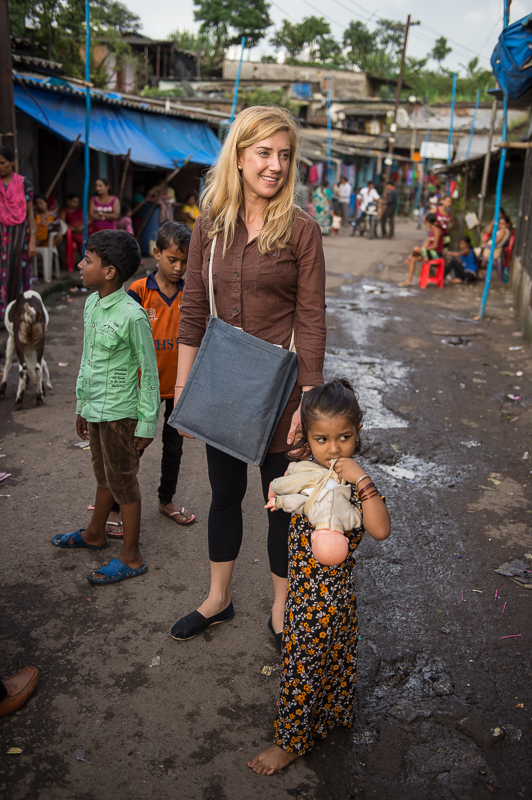
Jane Mosbacher Morris,
Founder of To the Market
What is To the Market and how did it get started?
TO THE MARKET | Survivor-made Goods (TTM) combines the powers of commerce and storytelling to empower the world’s most courageous survivor populations. We’ve developed a three-pronged social enterprise model that we believe reflects the needs of organizations employing survivors of abuse, conflict, or disease to help ensure that these organizations can continue to provide steady work to the survivors.
Our goal is that the survivors in our network eventually achieve economic independence, meaning that they aren’t dependent on someone or something else.
Our model includes (1) promoting survivor-made goods via our multiple distribution channels, including pop-up shops, custom sourcing, retail partnerships, and our online marketplace; (2) offering a platform for survivors and their champions to share their stories through TTM’s Stories and Huffington Post blogs; and (3) providing tailored services, such as trend forecasting and basic mental health resources, to our partners to improve production and management.
I started TTM after a trip to Kolkata, India revealed a way to impact the most vulnerable survivor communities by offering them an opportunity to earn an income.
I saw the light in the eyes of the survivor turned artisans when they were given the chance to earn—they wanted the dignity of work. I began speaking to incredible people all over the globe (including in the U.S.) who had created social enterprises to employ different survivor populations, usually by employing them to produce handicrafts.
I heard really positive feedback about the model of employing survivors (and all of the incredible benefits to the self-esteem and trajectory of the survivor and his or her children). However, I also heard about the challenges of making this model work—TTM aims to help augment these challenges.
Who are the artisans at To the Market?
TTM identifies and teams up with existing organizations currently employing survivors of abuse, conflict, or disease. We call these organizations “local partners”. Local partners consist of non-profits and for-profit social enterprises that have already set up shop, hired, and trained survivors to produce products.
TTM focuses on certain types of survivor populations. This includes, but is not necessarily limited to; survivors of abuse, such as survivors of domestic violence, physical and sexual abuse, and human trafficking; survivors of conflict, such as war widows, refugees, or persons living in conflict/post-conflict states ; or survivors of disease, including populations living with HIV/AIDS, leprosy, or physical disabilities.
We have partners across the globe, including in the U.S., South America, Africa, and Asia.
Do you see a pattern in consumers’ behavior when it comes to shopping responsibly?
I think there is a desire to shop more responsibly, but it often comes down to what people can afford. I am really proud of the fact that our local partners make a variety of products at all different price points—on-trend bracelets for under twenty dollars to timeless cashmere scarves for several hundred dollars.
Can you share a personal story that you think best represents the mission of the online shop?
I recently spent nearly a month in Nepal and India visiting with many of our local partners. I was particularly reminded of how transformational economic independence can be to these survivors when I spent time with their children—their daughters, especially. Most of the survivors we work with are women. When the women achieve economic independence, their daughters are so much less likely to be exploited. We recently wrote about a shelter in New Delhi, India that employs HIV/AIDs infected and affected women. You can see the video about the shelter and read about it on our Stories blog here.
How did you get involved with this work?
I began my career in counterterrorism with a focus on the intersection of women and security. Much of my mission was to try to elevate the role of women in national security-related issues, but I consistently found that women with some form of economic independence had so much more leverage in their family, community, and country than those with none.
That (five year) experience got the wheels turning quickly about the importance of economic independence in empowering vulnerable populations. When I went to work for the McCain Institute on human trafficking, I really saw how vital it was for survivors of some sort of trauma (whether it be abuse, conflict, or disease) to have access to some income.
It brings me extraordinary joy to be a part of the life-changing process of gaining even the slightest bit of independence.
What are your favorite picks for this holiday season?
- For Mom: I love this 100% cashmere scarf hand spun by master spinners in the Kashmir Valley! Each scarf contains the women’s initials that made it.
- For Dad: I love this red spice and merlot trivet. It’s the perfect size for cuff links, receipts, or coins and is neutral enough to sit comfortably on a nightstand or office desk. It’s hand-woven by craftswomen in Rwanda.
- For college kids: I have to suggest the patrice signature bag, which I am currently carrying by No41. It has two major points of impact!
- First, it provides a stable job and sustainable income to a young woman transitioning into a life of independence from living in an orphanage in Rwanda.
- SECOND (and perfect for the college student), it provides 240 meals to a secondary student in Rwanda!
- For kids: I love these brightly colored elephant ornaments (in pink or blue) hand-sewn by women in the Ivory Coast. Pink and blue patterns make it easy to pick for a boy or girl.
- For the office or book/dinner club gift exchange: I selected either a Sari Coin Purse hand-sewn by human trafficking survivors in Kolkata, India or this Hope Ornament pounded out of recycled metal oil drums in Haiti. Even if you don’t have a tree, you can hang this Hope sign up to encourage you! Both come in under $10, the perfect price point for small gifts.
- I am also including a couple “splurge on yourself “ items because I feel like most moms that I know only spend on others! I’ve included the Holiday Festive skirt, because it’s the perfect pattern for this time of year and also because it’s made by stay-at-home moms in Belize who are caring for sick children. Or, this Soledad Peru bag. The Suede straps and bottom make it strong enough to carry six wine bottles (yes, please!). The bag was made by women weavers in a valley deeply scarred by the Shining Path.
How can World Moms help spread the word about shopping responsibly this holiday season and beyond?
What a great question! Helping to get the word out about social enterprises like TO THE MARKET via social media and blogging is a tremendous help, in itself. Someone doesn’t have to have a huge following, either! Just telling your family or friends that these social enterprises exist makes a difference. So much of why so many social enterprises struggle is because they don’t have the marketing budget that big box retailers have to tell their story. There is nothing more flattering (or effective) than a personal referral!
This is an original interview with To the Market founder, Jane Mosbacher Morris, for World Moms Blog. You can learn more about the good work and great products To The Market sells by visiting their website (http://www.tothemarket.com/goods)
The image in this post is used by permission from To the Market.
World Moms Blog is an award winning website which writes from over 30 countries on the topics of motherhood, culture, human rights and social good. Over 70 international contributors share their stories from around the globe, bonded by the common thread of motherhood and wanting a better world for their children.
World Moms Blog was listed by Forbes Woman as one of the "Best 100 Websites for Women 2012 & 2013" and also called a "must read" by the NY Times Motherlode in 2013. Our Senior Editor in India, Purnima Ramakrishnan, was awarded the BlogHer International Activist Award in 2013.
More Posts
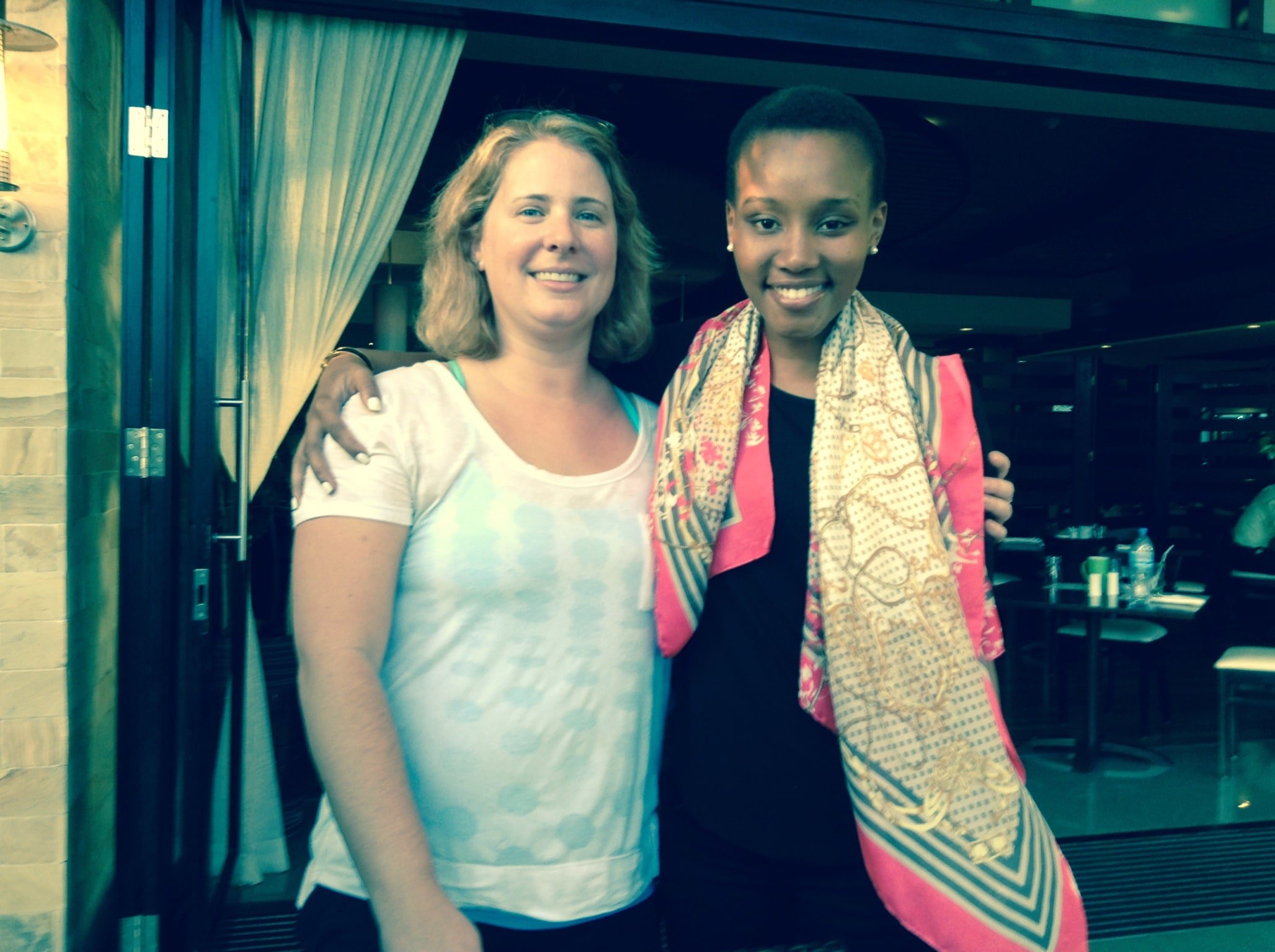
by Alison Fraser | Dec 1, 2014 | Africa, AIDS, Canada, Family, Health, Human Rights, Humanity, Nancy Sumari, ONE, Social Good, World Voice
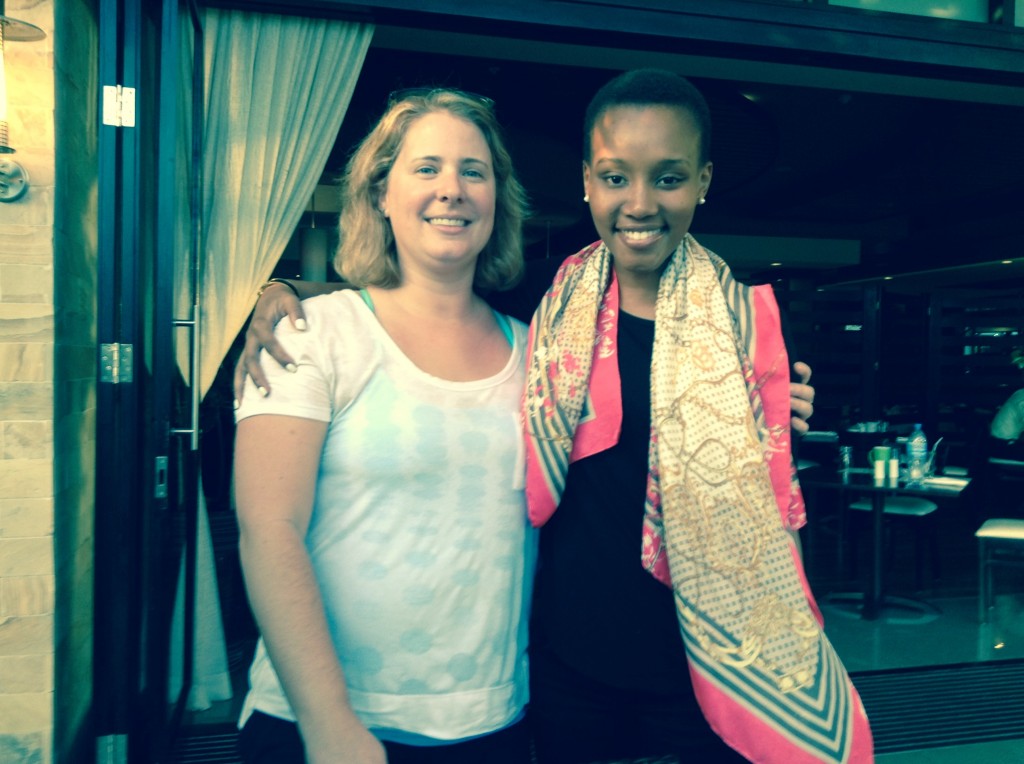
I am by no means an expert on HIV or AIDS. In fact, other than knowing some basic statistics and facts on transmission, I have never really given much thought to the social implications of living with the virus. This wasn’t intentional, but most likely the result of the small bubble in which I was living for most of my life; a bubble that did not include any friends or family directly affected by the virus. That all changed, last November, when I visited Arusha, Tanzania to meet some of the students in the Mom2Mom Africa Organization, a small not for profit that I founded several years before. I knew some of our students came from families in which some members were positive. Some were left orphaned by the disease. But what I didn’t realize was how this impacted these children in terms of treatment by their local community, regardless of their HIV status. I learned of children who were shunned by the church because the deaths of their parents was attributed to AIDS. I learned of other families shunned by their own relatives for the same reason. In some instances, the children were not even aware of why their parents died. It was hidden to protect them.
I left Tanzania with a heavy heart, but it was made heavier by the stories of the struggles of some of our students because of the AIDS pandemic. I had suspected that discrimination existed but I now had little faces associated with that discrimination haunting me, making it more real. Students are accepted into Mom2Mom Africa regardless of HIV status…I can think of operating no other way. In fact, we only request medical information so we can provide the appropriate health care.
I was now beginning to understand that this virus was not only killing people, but leaving behind families to deal with the shameful treatment by society.
Our affected students not only required extra medical attention, but also more emotional support.
I began to wonder if those affected by HIV/AIDS in Canada feel the same degree of isolation. Did being HIV positive in Canada carry with it the same stigma as in Tanzania? I decided to find out. Speaking to the AIDS Committee of Cambridge, Kitchener, Waterloo & Area (ACCKWA), I learned that, unfortunately, Canadians often face the same discrimination and stigma. Although laws are in place to help prevent discrimination, it still occurs. Many of those affected by HIV are judged, and often blamed for their HIV status. Thankfully, there are support groups such as the ACCKWA that provide a safe place and much-needed services to those living with HIV in our local community.
After speaking to ACCKWA, I contacted my friend, and fellow World Moms Blog contributor, Nancy Sumari to discuss what support services are in place for those living with HIV, and their families, in Tanzania. Nancy is part of the “I am Positive” Campaign in Tanzania. The campaign was established in response to reports by those living with HIV of being discriminated against and, in some cases, being physically assaulted and emotionally abused because of their HIV status. The campaign has several main objectives, but the one that hit home the most was:
“To live with HIV/AIDS is NOT to live without human rights and dignity”.
The power of that message is not only incredible, but universal. Regardless of what country you live in, what part of the world you live in, and what your HIV status is, you have the right to basic human rights and to live with dignity. We ALL deserve this.
As I reflect on this past year, and what I have learned about the realities those living with HIV face each and every day, I can’t help but dream of a day when the stigma no longer exists; a day when judgement and discrimination are replaced with support and understanding. Or better yet, I dream of a day when HIV and AIDS move from pandemic status to curable infection. But, until then, I hope that empathy prevails for all those living with HIV, as well as for their families.
This is an original post written by Alison Fraser for World Moms Blog.
Alison Fraser is the mother of three young girls ranging in age from 5 to 9 years old. She lives with her family in Cambridge, Ontario, Canada. Alison works as an Environmental Toxicologist with a human environment consulting company and is an active member of the Society of Environmental Toxicology and Chemistry (SETAC). She is also the founder and director of the Canadian Not for Profit Organization, Mom2Mom Africa, which serves to fund the school fees of children and young women in rural Tanzania. Recently recognized and awarded a "Women of Waterloo Region" award, Alison is very involved in charitable events within her community including Christmas Toy and School Backpack Drives for the local foodbank.
More Posts - Website
Follow Me:


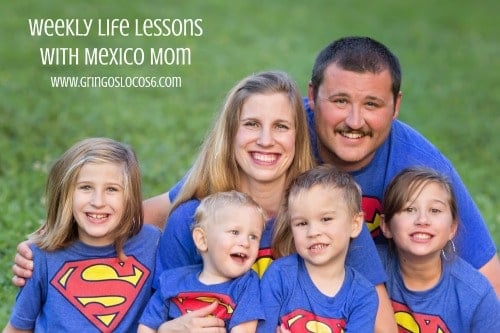
by Tina Marie Ernspiker | Nov 28, 2014 | 2014, Cooking, Education, Expat Life, Family, Husband, Living Abroad, Mental Health, Mental Illness, Mexico, Motherhood, Parenting, Water, World Motherhood
 As a wife of one and a mom of four, it seems like I am always learning and discovering! I know I am not alone. Let’s just admit it: The world is a big place, life is a lesson, and children can be the best teachers. Normally my series, Life Lessons with Mexico Mom, is hosted on Los Gringos Locos, but today I am posting here on World Moms Blog.
As a wife of one and a mom of four, it seems like I am always learning and discovering! I know I am not alone. Let’s just admit it: The world is a big place, life is a lesson, and children can be the best teachers. Normally my series, Life Lessons with Mexico Mom, is hosted on Los Gringos Locos, but today I am posting here on World Moms Blog.
Here are my insights and experiences as a Mexico Mom for this week:
Life Lesson 25: The city of Morelia, Mexico may shut off your water at any time without given notice. If this happens make sure your water tank is full! We have to press a switch to fill our water tank every other day or so. If we forget, we are without water for a few minutes. If the city turns off the water, we may be without water for a day. Then our wonderful landlord brings us a huge barrel of water for the toilets and the dishes. Yea!
Life Lesson 26: Driving through Morelia you could very well see a naked woman in the middle of the street. Unfortunately there is not much government help for the poor and mentally ill in our city. This part is actually very sad. My husband saw this poor lady, stark naked, with a pile of clothes in front of her. Chances are she was homeless and mentally ill. Cars were slowing down and people were staring. Brad was flabbergasted. There is not much he could have done for her. She would probably have been scared of my large, white husband.
Life Lesson 27: It is not necessary to have a stove and oven. Since we moved into our new house a month ago I have been without this appliance. I miss it dearly and hope to purchase one very soon. But on the upside, we have discovered just how much you can cook on a grill. Banana bread, pancakes, casseroles, scrambled eggs, quesadillas, pulled pork, and lots more! Brad has become a professional grill chef. Cooking is not my forte, so I am loving it!
What life lesson did you learn this past week? Please share it with us below. We want to hear your thoughts from around the world!
This is an original post to World Moms Blog by Tina Marie Ernspiker. Tina can be found blogging over at Los Gringos Locos. She is also on Facebook and Twitter.
Photo credit to A. Hurst Photography

by ThinkSayBe | Nov 14, 2014 | 2014, Communication, Discipline, Divorce, Education, Girls, Homeschooling, Kids, Older Children, Parenting, ThinkSayBe, USA, World Motherhood, Younger Children
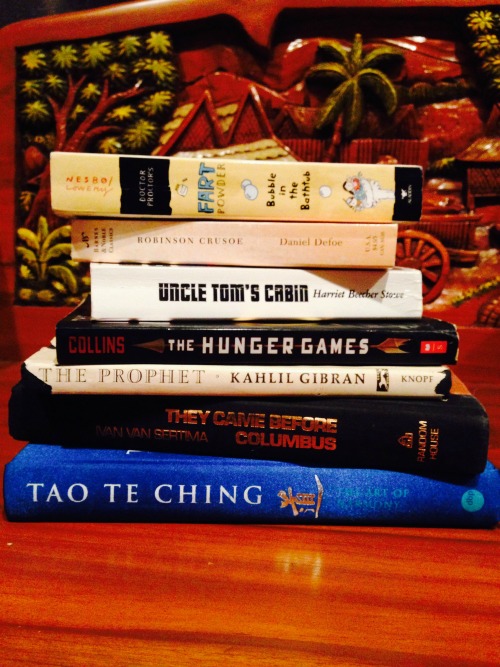 Over the past ten years, my daughter has read quite a few books. She started reading books like The Berenstain Bears series when she was two or three years old; it was a favorite activity to do with her grandma.
Over the past ten years, my daughter has read quite a few books. She started reading books like The Berenstain Bears series when she was two or three years old; it was a favorite activity to do with her grandma.
By age six she was really into the Magic Tree House series, devouring them as soon as she got them home. She also had some strange requests at age six, like the book Growing Up in Mississippi. Personally, I thought that was a fine book for her to read, except for the third part which talks about the main character’s high school years (and experiences that accompany that time of life).
Of course I was in mom heaven, having a child who was such an avid reader. Her interest in reading spilled over into school, and she participated in various reading programs, and won some medals; which she absolutely loved.
The majority of the books she has read since age six have either been on a required school list of readings, suggested readings, part of a competition (like Battle of the Books), or popular books approved by her peers and teenagers (e.g. The Hunger Games).
Two years ago we told her that she needed to read some classics as well.
We explained that there is at least one reason why certain books are internationally recognized, and how books like The Hunger Games are partially a product of these classics’ influence on the new authors. My assignment for her (as a part of homeschool) was to read Frederick Douglass, a child-friendly version of The Hunger Games.
Her father’s assignment immediately after Frederick Douglass was The Lord of the Flies. She lives with her dad on weekends, but there was no escaping this reading ‘thing’ her parents were making her do! Poor girl! No breaks on weekdays or weekends.
I really tried to get her to enjoy reading Frederick Douglass. She and I talked about American history and how this book was about overcoming enslavement, and that it was important for her to read this as an African-American girl. I told her she could read whatever she wanted when she was finished, or even read a book of her choice simultaneously with this one. Nothing worked. She went from reading a book a week, to taking six months to finish Frederick Douglass’ biography. Lord of the Flies took a year for her to finish, and she really did not enjoy reading it.
After these two parent ‘fails’, I really just wanted her to read. I wanted her to rekindle the passion she had for reading and so I let her read almost whatever she liked. Her choices are actually pretty good. Some books have deep moral meanings, and some just talk about fun stuff like fart powder for the bathtub.
We used to keep books organized by content, but now we have shelves that carry books about varying subjects. By doing this, we hope that while she’s looking for a book to read, her eye may be caught by East Africa’s History, or The Prophet, or The Human Body, or something else she wouldn’t typically think she’d like.
Do you have a set of boundaries on what your child/ren can read? If so, what do you base it on? Have you tried to introduce different books to your child/ren? If so, how were they received?
This is an original post to World Moms Blog by Sophia. You can find her blogging at Think Say Be and on twitter @ThinkSayBeSNJ.
Photo credit to the author.
I am a mom amongst some other titles life has fortunately given me. I love photography & the reward of someone being really happy about a photo I took of her/him. I work, I study, I try to pay attention to life. I like writing. I don't understand many things...especially why humans treat each other & other living & inanimate things so vilely sometimes. I like to be an idealist, but when most fails, I do my best to not be a pessimist: Life itself is entirely too beautiful, amazing & inspiring to forget that it is!
More Posts
Follow Me:


by Cindy Levin | Nov 11, 2014 | 2014, Awareness, Elections, USA, World Events, World Moms Blog, World Voice

Cynthia and her daughters take a family selfie after voting
I’m an American and I voted on November 4th. I’m guessing that most of the global readership of World Moms blog didn’t follow our elections because this is not a presidential election year, but that’s okay. A lot of Americans didn’t either. That’s not okay.
Shamefully, only 38% of Americans voted in this November 4th election, which means 6 in 10 of us didn’t vote.
But that’s life. Low voter turn out in the off years of politics is just the way it goes. People tune out without the razzle-dazzle of a presidential slugfest and a new Congress is elected. But, now what do we do if we want to make our country better? Do we have to wait another two years to have a say? No. Not at all!
As angry as some people in my country tend to get with the leader of our country, the president of the United States is not the only one who has influence over policies that have wide-reaching impact on the lives of Americans and all residents of planet Earth. Members of Congress are elected to represent us in our 50 states and have their own measure of power on domestic and global affairs that can help or hinder a presidential agenda. For instance, the president can make budget recommendations, but only Congress can approve the actual spending of money. Budget decisions, foreign aid policies, gun laws, environmental policies, and a host of other choices are made by senators and representatives all year round.
This leads me to my main point. Election day is not the only day when Americans have a voice in government.
Since important decisions are being made every day, then every single day is an opportunity for Americans to shape U.S. policies whether it be through tweeting, blogging, writing letters to the editor, calling members of Congress, writing handwritten letters to Congress, or meeting face-to-face in Congressional offices. All of these actions are open to us. It is our right as citizens. (By the way, even if you’re not a citizen you can still write to U.S. newspapers or use Twitter to organize)
The idea that Americans can only affect what our government does only once every 4 years is a naive and antiquated notion.

U.S. Representative Jan Schakowksy of Illinois reads a letter from Cynthia’s children about supporting global child survival programs.
TV news – or any news, really – would lead anyone to think that voting or contributing large amounts of money are the only things that citizens can do. When so many people don’t know what kinds of effective actions they can personally take, most people end up just frustrated and giving up on our system without ever truly being a part of it. That’s the bad news. The good news is that this huge gap between most citizens and government creates space for concerned citizen lobbyists to slide right in and have great impact. I’m talking about everyday, concerned citizens just like you!
Even a modest amount of 10-20 phone calls on a topic can sometimes greatly influence a member of Congress because few Americans really bother to do it. A constituent meeting face-to-face with congressional staff or an actual member of Congress is even more rare and makes even more impact. These simple actions can have a great effect, especially if it’s an important yet little known issue.
Take, for example, funding to fight tuberculosis (TB), a highly contagious airborne disease. Most people in the U.S. think it doesn’t even exist anymore if they’ve ever thought about it at all. The truth is that in 2012, 8.6 million people fell ill with TB and more than 1.3 million people died from it, making TB the most deadly curable disease in the world. 95% of cases happening in low or middle-income countries, but since it spreads through the air when an infected person coughs, sneezes, or talks it can jump to wealthy nations even easier than Ebola. If treated improperly or ignored, it gives rise to forms of multi drug-resistant TB, which are far more difficult and costly to treat. RESULTS volunteer advocates keep up the drumbeat to members of Congress to fund the very inexpensive treatments to save lives across the globe and in the U.S. to make a tremendous impact on the dignity and income of people in poverty who can keep working in good health. Since no one is actually lobbying against saving lives from TB, a relatively small number of volunteers can educate their elected officials about it and have a huge impact on global health to the tune of $1.1 billion in new resources last year and $1.4 billion overall for the Global Fund to Fight AIDS, TB and Malaria. All this is done by earnest citizens voicing opinions without the media circus of an election cycle.
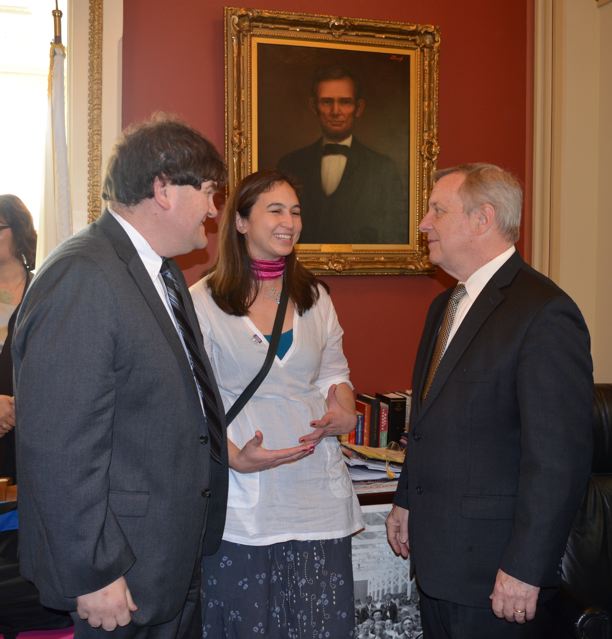
Cynthia and fellow RESULTS activist Richard Smiley talk to U.S. Senator Dick Durbin of IL about microfinance
Every election day, I encourage my fellow Americans to get out and vote, to be sure! That’s where engaged citizenship starts. But we shouldn’t stop there. Let our elected officials know what you want after they’re in office even if – especially if – they are not of the party you favor. Get involved with an advocacy group that shares your global outlook and desires to help mothers and children. (ONE, RESULTS, Shot@Life, and Bread for the World are great places to start) In our country, senators and representatives represent are supposed to work for US. It is your right and privilege to contact them on the issues that are important to you. Don’t waste it!
This is an original post written by Cindy Levin for World Moms Blog.
Do you vote?
Cynthia Changyit Levin is a mother, advocate, speaker, and author of the upcoming book “From Changing Diapers to Changing the World: Why Moms Make Great Advocates and How to Get Started.” A rare breed of non-partisan activist who works across a variety of issues, she coaches volunteers of all ages to build productive relationships with members of Congress. She advocated side-by-side with her two children from their toddler to teen years and crafted a new approach to advocacy based upon her strengths as a mother. Cynthia’s writing and work have appeared in The New York Times, The Financial Times, the Washington Post, and many other national and regional publications. She received the 2021 Cameron Duncan Media Award from RESULTS Educational Fund for her citizen journalism on poverty issues. When she’s not changing the world, Cynthia is usually curled up reading sci-fi/fantasy novels or comic books in which someone else is saving the world.
More Posts - Website
Follow Me:


by Kirsten Doyle (Canada) | Nov 7, 2014 | 2014, Awareness, Boys, Canada, Communication, Girls, Kids, Parenting, Rape, Relationships, Respect, Sex, Sexual Assault, Sexuality, Women's Rights, World Motherhood
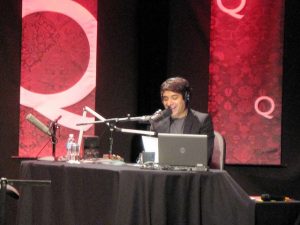 It’s not often that I get riled up over things that happen in the news, especially in Canada. Yes, we have some outrageous things happening here, but for the most part, Canadian society is reasonably civilized.
It’s not often that I get riled up over things that happen in the news, especially in Canada. Yes, we have some outrageous things happening here, but for the most part, Canadian society is reasonably civilized.
However, a story that’s currently unfolding has me feeling a little sick. It is the story of Jian Ghomeshi, a popular radio show host who has just been fired amid a storm of allegations. (more…)

Kirsten Doyle was born in South Africa. After completing university, she drifted for a while and finally washed up in Canada in 2000. She is Mom to two boys who have reached the stage of eating everything in sight (but still remaining skinny).
Kirsten was a computer programmer for a while before migrating into I.T. project management. Eventually she tossed in the corporate life entirely in order to be a self-employed writer and editor. She is now living her best life writing about mental health and addictions, and posting videos to two YouTube channels.
When Kirsten is not wrestling with her kids or writing up a storm, she can be seen on Toronto's streets putting many miles onto her running shoes. Every year, she runs a half-marathon to benefit children with autism, inspired by her older son who lives life on the autism spectrum.
Final piece of information: Kirsten is lucky enough to be married to the funniest guy in the world.
Connect with her on Facebook, Twitter and Instagram.
Be sure to check out her YouTube channels at My Gen X Life and Word Salad With Coffee!
More Posts
Follow Me:











 As a wife of one and a mom of four, it seems like I am always learning and discovering! I know I am not alone. Let’s just admit it: The world is a big place, life is a lesson, and children can be the best teachers. Normally my series, Life Lessons with Mexico Mom, is hosted on Los Gringos Locos, but today I am posting here on World Moms Blog.
As a wife of one and a mom of four, it seems like I am always learning and discovering! I know I am not alone. Let’s just admit it: The world is a big place, life is a lesson, and children can be the best teachers. Normally my series, Life Lessons with Mexico Mom, is hosted on Los Gringos Locos, but today I am posting here on World Moms Blog.






 Over the past ten years, my daughter has read quite a few books. She started reading books like The Berenstain Bears series when she was two or three years old; it was a favorite activity to do with her grandma.
Over the past ten years, my daughter has read quite a few books. She started reading books like The Berenstain Bears series when she was two or three years old; it was a favorite activity to do with her grandma.








